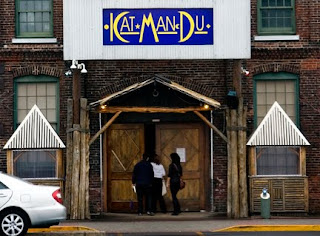NEW YORK — A judge Thursday threw out a murder case against a man imprisoned for nearly two decades and declared he was innocent, saying a key witness lied and others influenced one other into identifying him as the shooter.
Fernando Bermudez cried and hugged one of his lawyers as the judge took the unusual step of not only overturning his 1992 conviction but dismissing the charges, rather than calling for a retrial.
Bermudez "has demonstrated his actual innocence," state Supreme Court Justice John Cataldo said. "This court wishes to express its profound regret over the past 18 years. I hope for you a better future."
With his parents, wife and other relatives sobbing and applauding in the courtroom, Bermudez was led away after the ruling. The 40-year-old remains behind bars for now because of an unrelated federal drug-sale conviction that carried a 27-month sentence. His lawyers plan to ask federal authorities to credit him for the time he has served and release him.
"This is too long, but justice is ours today," his tearful wife, Crystal, said outside court. "He's a good man. He didn't deserve to have this happen to him."
The ruling bars a retrial, and the Manhattan District Attorney's office had said it wouldn't pursue one because eyewitnesses have recanted and would no longer testify. But prosecutors said they still believe Bermudez is guilty and were examining their options, including a potential appeal.
"We strongly disagree with the judge's decision," Chief Assistant District Attorney Mark Dwyer said. "We don't think the defense has shown that there was anything wrong with the verdict."
The Aug. 4, 1991, shooting killed 16-year-old Raymond Blount. He was gunned down as he left a nightspot near Manhattan's Union Square after getting into a fight with another teen inside the club.
The other teen identified Bermudez as the gunman, and four bystander eyewitnesses identified him from police photograph files and then a lineup.
Four of Bermudez' friends testified that he was with them, miles away, at the time of the crime; friends of Blount's also said Bermudez wasn't the shooter, according to the judge's ruling. No forensic evidence linked him to the crime.
Bermudez' lawyers presented evidence that the eyewitnesses had improperly consulted among themselves before picking him from police photos, instead of identifying him separately. They have subsequently recanted.
Prosecutors say Bermudez' defense team threatened or induced them to change their stories, but the judge found "no improper conduct."
The teen involved in the fight – who testified against Bermudez under an agreement sparing him criminal charges – delivered "a total fabrication" on the witness stand, Cataldo wrote. He said a roster of evidence actually pointed to one of the teen's friends, who has denied involvement.
"You combine the cooperating witness who lied with the eyewitnesses who conferred with one another, and you have an innocent man in jail for 18 years," said one of Bermudez' lawyers, Barry J. Pollack.
While serving a sentence of 23 years to life, Bermudez has completed most of a college degree, his family said. He and his wife have three children.







